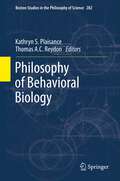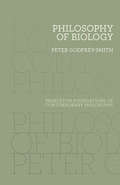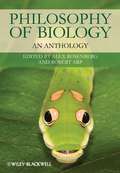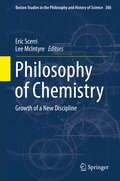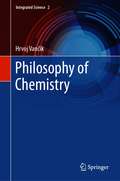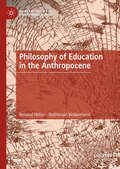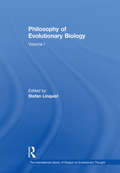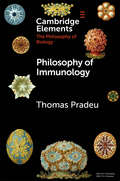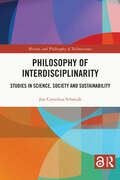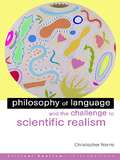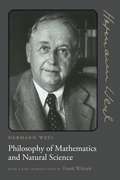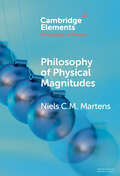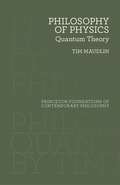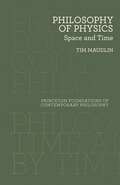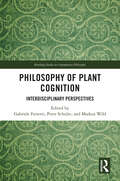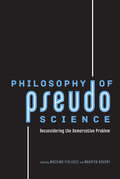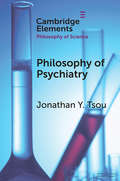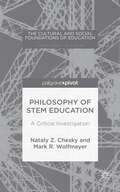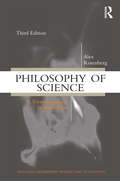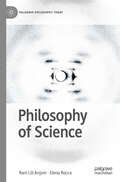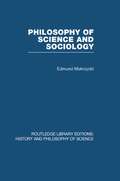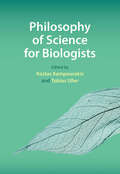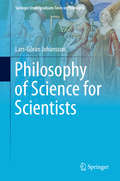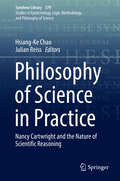- Table View
- List View
Philosophy of Behavioral Biology
by Thomas A.C. Reydon Kathryn S. PlaisanceThis volume provides a broad overview of issues in the philosophy of behavioral biology, covering four main themes: genetic, developmental, evolutionary, and neurobiological explanations of behavior. It is both interdisciplinary and empirically informed in its approach, addressing philosophical issues that arise from recent scientific findings in biological research on human and non-human animal behavior. Accordingly, it includes papers by professional philosophers and philosophers of science, as well as practicing scientists. Much of the work in this volume builds on presentations given at the international conference, "Biological Explanations of Behavior: Philosophical Perspectives", held in 2008 at the Leibniz Universität Hannover in Germany. The volume is intended to be of interest to a broad range of audiences, which includes philosophers (e.g., philosophers of mind, philosophers of biology, and metaethicists), as well as practicing scientists, such as biologists or psychologists whose interests relate to biological explanations of behavior.
Philosophy of Biology (Princeton Foundations of Contemporary Philosophy #8)
by Peter Godfrey-SmithAn essential introduction to the philosophy of biologyThis is a concise, comprehensive, and accessible introduction to the philosophy of biology written by a leading authority on the subject. Geared to philosophers, biologists, and students of both, the book provides sophisticated and innovative coverage of the central topics and many of the latest developments in the field. Emphasizing connections between biological theories and other areas of philosophy, and carefully explaining both philosophical and biological terms, Peter Godfrey-Smith discusses the relation between philosophy and science; examines the role of laws, mechanistic explanation, and idealized models in biological theories; describes evolution by natural selection; and assesses attempts to extend Darwin's mechanism to explain changes in ideas, culture, and other phenomena. Further topics include functions and teleology, individuality and organisms, species, the tree of life, and human nature. The book closes with detailed, cutting-edge treatments of the evolution of cooperation, of information in biology, and of the role of communication in living systems at all scales.Authoritative and up-to-date, this is an essential guide for anyone interested in the important philosophical issues raised by the biological sciences.
Philosophy of Biology: An Anthology
by Robert Arp Alex RosenbergBy combining excerpts from key historical writings with editors' introductions and further reading material, Philosophy of Biology: An Anthology offers a comprehensive, accessible, and up-to-date collection of the field's most significant works. Addresses central questions such as 'What is life?' and 'How did it begin?', and the most current research and arguments on evolution and developmental biology Editorial notes throughout the text define, clarify, and qualify ideas, concepts and arguments Includes material on evolutionary psychology and evolutionary developmental biology not found in other standard philosophy of biology anthologies Further reading material assists novices in delving deeper into research in philosophy of biology
Philosophy of Chemistry
by Lee Mcintyre Eric ScerriThis volume follows the successful book, which has helped to introduce and spread the Philosophy of Chemistry to a wider audience of philosophers, historians, science educators as well as chemists, physicists and biologists. The introduction summarizes the way in which the field has developed in the ten years since the previous volume was conceived and introduces several new authors who did not contribute to the first edition. The editors are well placed to assemble this book, as they are the editor in chief and deputy editors of the leading academic journal in the field, Foundations of Chemistry. The philosophy of chemistry remains a somewhat neglected field, unlike the philosophy of physics and the philosophy of biology. Why there has been little philosophical attention to the central discipline of chemistry among the three natural sciences is a theme that is explored by several of the contributors. This volume will do a great deal to redress this imbalance. Among the themes covered is the question of reduction of chemistry to physics, the reduction of biology to chemistry, whether true chemical laws exist and causality in chemistry. In addition more general questions of the nature of organic chemistry, biochemistry and chemical synthesis are examined by specialist in these areas.
Philosophy of Chemistry (Integrated Science #2)
by Hrvoj VančikThis book, Philosophy of Chemistry, is dedicated to some of the general principles of philosophy of chemistry, the special branch of philosophy of science. Since the work is a collection of lectures that the Author gave at the University of Zagreb (Croatia) during the period of twenty years, the book could serve also as a university textbook in philosophy of chemistry. Philosophy of chemistry is represented through the discussion about some of the general philosophical problems such as, theory of complexity, autonomy of sciences, epistemology, falsificationism, emergence and unity of science, holism and reductionism, the problem of identity, and hierarchical structures, as well as the teleological aspects of science. The work consists from thirteen chapters where the main science-philosophical problems are represented and discussed within the historical context of the development of chemistry as a science. The book is aimed at wider academic audience interesting in the philosophy of science, and especially at university students of life sciences.
Philosophy of Education in the Anthropocene (Palgrave Studies in Educational Futures)
by Renaud Hétier Nathanaël WallenhorstThis book develops a philosophy of education for the Anthropocene, proposing that we think about education in the light of contemporary bioclimatic challenges. Education is seen as the political means of choice for containing the runaway Earth system change and ensuring the sustainability of human life in society. In this book, Hétier and Wallenhorst continue their work on the biogeophysical and socio-political analysis of the Anthropocene here, tracing the path toward the re-founding of a political education to prepare students to address the greatest challenge of our time: the gradual disappearance of the bioclimatic conditions necessary for our very existence.
Philosophy of Evolutionary Biology: Volume I (The International Library of Essays on Evolutionary Thought)
by Stefan LinquistThe impact of evolutionary theory on the philosophy of science has been no less profound than its impact on the science of biology itself. Advances in this theory provide a rich set of examples for thinking about the nature of scientific explanation and the structure of science. Many of the developments in our understanding of evolution resulted from contributions by both philosophers and biologists engaging over theoretical questions of mutual interest. This volume traces some of the most influential exchanges in this field over the last few decades. Focal topics include the nature of biological functions, adaptationism as an explanatory and methodological doctrine, the levels of selection debate, the concepts of fitness and drift, and the relationship of evolutionary to developmental biology.
Philosophy of Immunology (Elements in the Philosophy of Biology)
by Thomas PradeuImmunology is central to contemporary biology and medicine, but it also provides novel philosophical insights. Its most significant contribution to philosophy concerns the understanding of biological individuality: what a biological individual is, what makes it unique, how its boundaries are established and what ensures its identity through time. Immunology also offers answers to some of the most interesting philosophical questions. What is the definition of life? How are bodily systems delineated? How do the mind and the body interact? In this Element, Thomas Pradeu considers the ways in which immunology can shed light on these and other important philosophical issues. This title is also available as Open Access on Cambridge Core.
Philosophy of Interdisciplinarity: Studies in Science, Society and Sustainability (History and Philosophy of Technoscience)
by Jan Cornelius SchmidtInterdisciplinarity is a hallmark of contemporary knowledge production. This book introduces a Philosophy of Interdisciplinarity at the intersection of science, society and sustainability. In light of the ambivalence of the technosciences and the challenge of sustainable development in the Anthropocene, this engaged philosophy provides a novel critical perspective on interdisciplinarity in science policy and research practice. It draws upon the original spirit of interdisciplinarity as an environmentalist concept and advocates an essential change in human-nature relations. The author utilizes the rich tradition of philosophy for case study analysis and develops a framework to disentangle the various forms of inter- and transdisciplinarity. Philosophy of Interdisciplinarity offers a foundation for a critical-reflexive program of interdisciplinarity conducive to a sustainable future for our knowledge society and contributes to fields such as sustainability sciences, social ecology, environmental ethics, technology assessment, complex systems, philosophy of nature, and philosophy of science. It injects a fresh way of thinking on interdisciplinarity – and supports researchers as well as science policy makers, university managers, and academic administrators in critical-reflexive knowledge production for sustainable development.
Philosophy of Language and the Challenge to Scientific Realism (Routledge Studies in Critical Realism)
by Christopher NorrisIn this book Christopher Norris develops the case for scientific realism by tackling various adversary arguments from a range of anti-realist positions. Through a close critical reading he shows how they fail to make adequate sense on any rational, consistent, and scientifically-informed survey of the evidence. Along the way he incorporates a number of detailed case-studies from the history and philosophy of science. Norris devotes much of his discussion to some of the most prominent and widely influential source-texts of anti-realism. Also included are the sophisticated versions of verificationism developed - albeit in very different ways - by thinkers such as Michael Dummett and Bas van Fraassen. Central to Norris's argument is a prolonged engagement with the once highly influential but nowadays neglected work of Norwood Russell Hanson. This book will be welcomed especially by readers who possess some knowledge of the background debate and who wish to deepen and extend their understanding of these issues beyond an introductory level.
Philosophy of Mathematics and Natural Science
by Hermann WeylWhen mathematician Hermann Weyl decided to write a book on philosophy, he faced what he referred to as "conflicts of conscience"--the objective nature of science, he felt, did not mesh easily with the incredulous, uncertain nature of philosophy. Yet the two disciplines were already intertwined. In Philosophy of Mathematics and Natural Science, Weyl examines how advances in philosophy were led by scientific discoveries--the more humankind understood about the physical world, the more curious we became. The book is divided into two parts, one on mathematics and the other on the physical sciences. Drawing on work by Descartes, Galileo, Hume, Kant, Leibniz, and Newton, Weyl provides readers with a guide to understanding science through the lens of philosophy. This is a book that no one but Weyl could have written--and, indeed, no one has written anything quite like it since.
Philosophy of Microbiology
by Maureen A. O'MalleyMicrobes and microbiology are seldom encountered in philosophical accounts of the life sciences. Although microbiology is a well-established science and microbes the basis of life on this planet, neither the organisms nor the science have been seen as philosophically significant. This book will change that. It fills a major gap in the philosophy of biology by examining central philosophical issues in microbiology. Topics are drawn from evolutionary microbiology, microbial ecology, and microbial classification. These discussions are aimed at philosophers and scientists who wish to gain insight into the basic philosophical issues of microbiology.
Philosophy of Physical Magnitudes (Elements in the Philosophy of Physics)
by Niels C. MartensDimensional quantities such as length, mass and charge, i.e., numbers combined with a conventional unit, are essential components of theories in the sciences, especially physics, chemistry and biology. Do they represent a world with absolute physical magnitudes, or are they merely magnitude ratios in disguise? Would we notice a difference if all the distances or charges in the world suddenly doubled? These central questions of this Element are illustrated by imagining how one would convey the meaning of a kilogram to aliens if one were only allowed to communicate via Morse code.
Philosophy of Physics: Quantum Theory (Princeton Foundations Of Contemporary Philosophy Ser. #19)
by Tim MaudlinA sophisticated and original introduction to the philosophy of quantum mechanics from one of the world’s leading philosophers of physicsIn this book, Tim Maudlin, one of the world’s leading philosophers of physics, offers a sophisticated, original introduction to the philosophy of quantum mechanics. The briefest, clearest, and most refined account of his influential approach to the subject, the book will be invaluable to all students of philosophy and physics.Quantum mechanics holds a unique place in the history of physics. It has produced the most accurate predictions of any scientific theory, but, more astonishing, there has never been any agreement about what the theory implies about physical reality. Maudlin argues that the very term “quantum theory” is a misnomer. A proper physical theory should clearly describe what is there and what it does—yet standard textbooks present quantum mechanics as a predictive recipe in search of a physical theory.In contrast, Maudlin explores three proper theories that recover the quantum predictions: the indeterministic wavefunction collapse theory of Ghirardi, Rimini, and Weber; the deterministic particle theory of deBroglie and Bohm; and the conceptually challenging Many Worlds theory of Everett. Each offers a radically different proposal for the nature of physical reality, but Maudlin shows that none of them are what they are generally taken to be.
Philosophy of Physics: Space and Time (Princeton Foundations of Contemporary Philosophy #11)
by Tim MaudlinPhilosophical foundations of the physics of space-timeThis concise book introduces nonphysicists to the core philosophical issues surrounding the nature and structure of space and time, and is also an ideal resource for physicists interested in the conceptual foundations of space-time theory. Tim Maudlin's broad historical overview examines Aristotelian and Newtonian accounts of space and time, and traces how Galileo's conceptions of relativity and space-time led to Einstein's special and general theories of relativity. Maudlin explains special relativity with enough detail to solve concrete physical problems while presenting general relativity in more qualitative terms. Additional topics include the Twins Paradox, the physical aspects of the Lorentz-FitzGerald contraction, the constancy of the speed of light, time travel, the direction of time, and more.Introduces nonphysicists to the philosophical foundations of space-time theoryProvides a broad historical overview, from Aristotle to EinsteinExplains special relativity geometrically, emphasizing the intrinsic structure of space-timeCovers the Twins Paradox, Galilean relativity, time travel, and moreRequires only basic algebra and no formal knowledge of physics
Philosophy of Plant Cognition: Interdisciplinary Perspectives (Routledge Studies in Contemporary Philosophy)
by Gabriele Ferretti, Peter Schulte, and Markus WildThis volume features new research about the philosophy of plant intelligence and plant cognition, one of the most intriguing and complex current debates at the intersection of biology, cognitive science and philosophy.The debate about plant cognition is marked by deep disagreements. Some theorists are confident that the empirical evidence supports the ascription of cognitive capacities to plants. Others hold that such claims are overblown, and defend more traditional, non-cognitive accounts of plant behavior. Still others seek to formulate intermediate positions. This volume brings together leading researchers from across this theoretical spectrum to tackle the foundational questions that are at issue in the debate about plant cognition. The contributions focus on the philosophical questions raised by recent discoveries and controversies in the empirical sciences, such as: Can plants be said to have genuine cognitive abilities? Can they be characterized as representing or perceiving their environment, as pursuing goals, or even as having some form of conscious experience? Which data could provide evidence for such characterizations? And what are possible implications of these issues for general questions about the nature of cognition, representation, perception, and consciousness?Philosophy of Plant Cognition will be of interest to scholars and students working in philosophy of mind, philosophy of biology, cognitive science, and plant biology.
Philosophy of Pseudoscience: Reconsidering the Demarcation Problem
by Massimo Pigliucci Maarten BoudryWhat sets the practice of rigorously tested, sound science apart from pseudoscience? In this volume, the contributors seek to answer this question, known to philosophers of science as OC the demarcation problem. OCO This issue has a long history in philosophy, stretching as far back as the early twentieth century and the work of Karl Popper. But by the late 1980s, scholars in the field began to treat the demarcation problem as impossible to solve and futile to ponder. However, the essays that Massimo Pigliucci and Maarten Boudry have assembled in this volume make a rousing case for the unequivocal importance of reflecting on the separation between pseudoscience and sound science. a a a a a a Moreover, the demarcation problem is not a purely theoretical dilemma of mere academic interest: it affects parentsOCO decisions to vaccinate children and governmentsOCO willingness to adopt policies that prevent climate change. Pseudoscience often mimics science, using the superficial language and trappings of actual scientific research to seem more respectable. Even a well-informed public can be taken in by such questionable theories dressed up as science. Pseudoscientific beliefs compete with sound science on the health pages of newspapers for media coverage and in laboratories for research funding. Now more than ever the ability to separate genuine scientific findings from spurious ones is vital, and The Philosophy of Pseudoscience provides ground for philosophers, sociologists, historians, and laypeople to make decisions about what science is or isnOCOt. aa
Philosophy of Psychiatry (Elements in the Philosophy of Science)
by Jonathan Y. TsouJonathan Y. Tsou examines and defends positions on central issues in philosophy of psychiatry. The positions defended assume a naturalistic and realist perspective and are framed against skeptical perspectives on biological psychiatry. Issues addressed include the reality of mental disorders; mechanistic and disease explanations of abnormal behavior; definitions of mental disorder; natural and artificial kinds in psychiatry; biological essentialism and the projectability of psychiatric categories; looping effects and the stability of mental disorders; psychiatric classification; and the validity of the DSM's diagnostic categories. The main argument defended by Tsou is that genuine mental disorders are biological kinds with harmful effects. This argument opposes the dogma that mental disorders are necessarily diseases (or pathological conditions) that result from biological dysfunction. Tsou contends that the broader ideal of biological kinds offers a more promising and empirically ascertainable naturalistic standard for assessing the reality of mental disorders and the validity of psychiatric categories.
Philosophy of STEM Education: A Critical Investigation
by Nataly Z. Chesky Mark R. WolfmeyerFramed as educational equality initiatives that will help students gain the knowledge they need to compete in the global marketplace, STEM may be the most indicative educational reform discourse of our time and has grown to become one of the primary foci of educational policy, in part due to association with a wide array of today's industries: from information and communications technology to the medical field, to sustainability innovations. This book's primary focus is to shift the attention away from such utilitarian aims and ask critical questions about what aims the STEM initiatives are asking for and what assumptions do they hold about both teaching STEM and the nature of STEM content. In order to answer the above questions, the authors use a philosophical lens to study STEM policies as a political and social phenomenon.
Philosophy of Science
by Alex RosenbergAny serious student attempting to better understand the nature, methods and justification of science will value Alex Rosenberg's updated and substantially revised Third Edition of Philosophy of Science: A Contemporary Introduction. Weaving together lucid explanations and clear analyses, the volume is a much-used, thematically oriented introduction to the field. New features of the Third Edition include more coverage of the history of the philosophy of science, more fully developed material on the metaphysics of causal and physical necessity, more background on the contrast between empiricism and rationalism in science, and new material on the structure of theoretical science (with expanded coverage of Newtonian and Darwinian theories and models) and the realism/antirealism controversy. Rosenberg also divides the Third Edition into fifteen chapters, aligning each chapter with a week in a standard semester-long course. Updated Discussion Questions, Glossary, Bibliography and Suggested Readings lists at the end of each chapter will make the Third Edition indispensable, either as a comprehensive stand-alone text or alongside the many wide-ranging collections of articles and book excerpts currently available. Read our interview with Alex Rosenberg, What exactly is philosophy of science - and why does it matter? here: www.routledge.com/u/alexrosenberg
Philosophy of Science (Palgrave Philosophy Today)
by Rani Lill Anjum Elena RoccaThis textbook is a comprehensive, engaging, and user-friendly introduction to philosophy of science written by a philosopher and a scientist. By exploring traditional debates within philosophy of science, as well as analysing contemporary scientific controversies for philosophical bias, the reader is invited to reflect upon how philosophical assumptions influence scientific theory, methods, and practice. Key features: Is an accessible introduction to philosophy of science written by a philosopher and a scientist. Includes some of the many important contributions from women philosophers and scientists. Demonstrates the philosophical influences on scientific thinking, practice, and expert disagreement. Applies philosophy of science to analyse some specific real-life cases of scientific controversy. This book is an essential resource for students and teachers in philosophy of science. It is also ideal for anyone interested in the philosophical influences on contemporary science.
Philosophy of Science and Sociology: From the Methodological Doctrine to Research Practice (Routledge Library Editions: History & Philosophy of Science)
by Edmund MokrzyckiOriginally published in 1983. This book concentrates on the impact of philosophy of science on sociology and other disciplines. It argues that the impact of the philosophy of science on sociology from the rise of the Vienna Circle until the mid-1980s resulted in a deep-reaching and, in the author’s view, undesirable methodological reorientation in sociology.
Philosophy of Science for Biologists
by Kostas Kampourakis Tobias UllerBiologists rely on theories, apply models and construct explanations, but rarely reflect on their nature and structure. This book introduces key topics in philosophy of science to provide the required philosophical background for this kind of reflection, which is an important part of all aspects of research and communication in biology. It concisely and accessibly addresses fundamental questions such as: Why should biologists care about philosophy of science? How do concepts contribute to scientific advancement? What is the nature of scientific controversies in the biological sciences? Chapters draw on contemporary examples and case studies from across biology, making the discussion relevant and insightful. Written for researchers and advanced undergraduate and graduate students across the life sciences, its aim is to encourage readers to become more philosophically minded and informed to enable better scientific practice. It is also an interesting and pertinent read for philosophers of science.
Philosophy of Science for Scientists
by Lars-Göran JohanssonThis textbook offers an introduction to the philosophy of science. It helps undergraduate students from the natural, the human and social sciences to gain an understanding of what science is, how it has developed, what its core traits are, how to distinguish between science and pseudo-science and to discover what a scientific attitude is. It argues against the common assumption that there is fundamental difference between natural and human science, with natural science being concerned with testing hypotheses and discovering natural laws, and the aim of human and some social sciences being to understand the meanings of individual and social group actions. Instead examines the similarities between the sciences and shows how the testing of hypotheses and doing interpretation/hermeneutics are similar activities. The book makes clear that lessons from natural scientists are relevant to students and scholars within the social and human sciences, and vice versa. It teaches its readers how to effectively demarcate between science and pseudo-science and sets criteria for true scientific thinking. Divided into three parts, the book first examines the question What is Science? It describes the evolution of science, defines knowledge, and explains the use of and need for hypotheses and hypothesis testing. The second half of part I deals with scientific data and observation, qualitative data and methods, and ends with a discussion of theories on the development of science. Part II offers philosophical reflections on four of the most important concepts in science: causes, explanations, laws and models. Part III presents discussions on philosophy of mind, the relation between mind and body, value-free and value-related science, and reflections on actual trends in science.
Philosophy of Science in Practice
by Hsiang-Ke Chao Julian ReissThis volume reflects the 'philosophy of science in practice' approach and takes a fresh look at traditional philosophical problems in the context of natural, social, and health research. Inspired by the work of Nancy Cartwright that shows how the practices and apparatuses of science help us to understand science and to build theories in the philosophy of science, this volume critically examines the philosophical concepts of evidence, laws, causation, and models and their roles in the process of scientific reasoning. Each chapter is an important one in the philosophy of science, while the volume as a whole deals with these philosophical concepts in a unified way in the context of actual scientific practice. This volume thus aims to contribute to this new direction in the philosophy of science.
